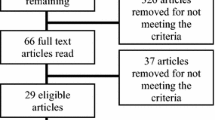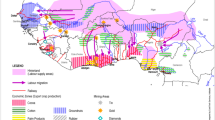Abstract
The recent economic crisis in Spain has provoked a number of food and nutrition security (FNS) impacts that have fuelled a fragmented landscape of food-related debates, although these have not taken the form of a coherent and all-embracing public discussion on national food security. This paper is an inductive analysis of such debates, mostly based on media coverage, in an attempt to disentangle the different discourse frames on FNS in Spain, and the role played by the economic crisis in the shaping and underpinning of such frames. For this purpose a frame matrix was constructed, paying particular attention to the stakeholders’ governance claims in order to confront frame-specific problems. Results show how stakeholders have used elements of the crisis to underpin or reinterpret their core arguments. In addition, governance claims have concentrated on the malfunctioning of the food chain, mostly due to unequal bargaining power, and the way this could be putting at risk crucial components of the food system and future FNS. Also, the short-termism of most stakeholders’ approaches obscures the long run threats to the Spanish food system.
Similar content being viewed by others
Notes
This assessment of the impact of climate change in Spain devotes a chapter to agriculture. However, there is no reference in this report to the potential impact on food security.
In rough terms, one third of the milk and half the cheese consumed in Spain are imported (Sineiro 2012); the import of grain supplies one third of the consumption.
There is an ongoing debate about the use of the term ‘food security’ (CFS 2012). In this paper, we adopt the term FNS as it considers not only the concept of food security as internationally accepted, but also nutritional aspects, including health services, healthy environment and caring practices (Pangaribowo et al. 2013), which fall within the scope of our analysis.
Obtained from Eurostat and the National Statistical Institute.
Abbreviation of ‘At Risk of Poverty or Social Exclusion’, which refers to the percentage of people either at risk of poverty, or severely materially deprived or living in a household with a very low work intensity. It is the main indicator used to monitor the EU 2020 Strategy poverty target.
During the Civil War (1936–1939) and the long post-war period, Spain suffered a serious deterioration of the food situation (see Cussó and Garrabou 2009).
A massive poisoning by consumption of adulterated rapeseed oil took place in Spain in the spring of 1981.
Two articles from British newspapers were also taken into consideration.
Joint position of a number of Spanish-based environmentalist NGOs (SEO/Birdlife, WWF, Greenpeace and Friends of the Earth) about the CAP reform.
Joint position of SEO/Birdlife and WWF.
Spain is the eighth largest exporter of food in the world. In 2014 agri-food exports reached a record value of € 40.8 billion,17 % of the national total exports.
In fact, the food and beverage industry in Spain has shown better performance in terms of employment than the economy overall during the crisis: job losses between 2007 and 2013 reached 9.8 %, well below the economy average (17.7 %) (Muñoz and Sosvilla 2014).
A recent report broadcasted in the British Channel 4 News about the hard working and living conditions of migrants in El Ejido (a zone of intensive greenhouse agriculture) provoked a rapid and massive response by Spanish farmers’ unions and related associations questioning the veracity of the information.
The debate has been a magnificent arena to observe the diverse positions about the CAP and its relationships with food security (Candel et al. 2014).
ASAJA is a more agribusiness-focused organisation. COAG and UPA are more rural and small and medium-sized holdings focused.
In this piece of news, a teacher told how a child said that his mother gave him a ‘magical sandwich’, bread with bread without anything else (the family could not afford the stuffing), so that he could imagine what was in between.
A survey performed in 2012 revealed that Spanish households throw out 1.5 million tonnes of food (1.3 kg/week/household) that is fit for consumption (Hispacoop 2012).
Although these organisations also receive support from the European Agricultural Guarantee Fund.
The Spanish branch of the ATTAC organisation founded in 1998 in France.
ANTAMA is a foundation aimed to promote biotech developments in agriculture.
References
Antentas, J. M., & Vivas, E. (2014). Impacto de la crisis en el derecho a una alimentación sana y saludable. Informe SESPAS 2014. Gaceta Sanitaria, 28(S1), 58–61.
Brunori, G., Malandrin, V., & Rossi, A. (2013). Trade-off or convergence? The role of food security in the evolution of food discourse in Italy. Journal of Rural Studies, 29, 19–29.
Candel, J. J., Breeman, G. E., Stiller, S. J., & Termeer, C. J. (2014). Disentangling the consensus frame of food security: the case of the EU common agricultural policy reform debate. Food Policy, 44, 47–58.
CFS – Committee on World Food Security (2012). Coming to Terms with Terminology. http://www.fao.org/fsnforum/sites/default/files/file/Terminology/MD776(CFS___Coming_to_terms_with_Terminology).pdf. Accessed 6 Oct 2015.
Cussó, X., & Garrabou, R. (2009). Dieta mediterránea y transición nutricional moderna en España. In L. G. Zubero, R. H. García, & J. M. Lázaro (Eds.), Economía Alimentaria en España durante el siglo XX (pp. 25–63). Madrid: MARM.
De Schutter, O. (2014). The specter of productivism and food democracy. Wisconsin Law Review, 199, 199–233.
DEFRA (2008). Ensuring the UK’s food security in a changing world. London: A Defra Discussion Paper.
Díaz-Méndez, C., & Gómez-Benito, C. (2010). Nutrition and the Mediterranean diet. A historical and sociological analysis of the concept of a “healthy diet” in Spanish society. Food Policy, 35(5), 437–447.
Dibden, J., Gibbs, D., & Cocklin, C. (2013). Framing GM crops as food security solution. Journal of Rural Studies, 29, 59–70.
Ericksen, P. J. (2008). Conceptualizing food systems for global environmental change research. Global Environmental Change, 18, 234–245.
FAO (2014). The State of the World’s Land and Water Resources for Food and Agriculture. http://www.fao.org/nr/solaw/maps-and-graphs/en/. Accessed 25 Feb 2015.
Fish, R., Lobley, M., & Winter, M. (2013). A license to produce? Farmer interpretations of the new food security agenda. Journal of Rural Studies, 29, 40–49.
Grando, S., & Colombo, L. (2015). National Report. Italy. WP2 report Transmango EU-FP7.
GREENPEACE (2014). Alimentos bajo amenaza. Valor económico de la polinización y vulnerabilidad de la agricultura española ante el declive de las abejas y otros polinizadores. Madrid: Greenpeace.
Hertel, T. W. (2015). The challenges of sustainably feeding a growing planet. Food Security, 7, 185–198.
Hispacoop (2012). Estudio sobre desperdicio de alimentos en los hogares. Madrid: Confederación Española de Cooperativas de Consumidores y Usuarios.
Lang, T., & Heasman, M. (2004). Food wars. The global battle for mouths, Minds and Markets. London: Earthscan.
Lawrence, G., & McMichael, P. (2012). The question of food security. International Journal of Sociology of Agriculture & Food, 19(2), 135–142.
MAGRAMA. (2014). La balanza commercial agroalimentaria en 2013. Madrid.
Maye, D., & Kirwan, J. (2013). Food security: a fractured consensus. Journal of Rural Studies, 29, 1–6.
McKeon, N. (2015). Food security governance: empowering communities, regulating corporations. New York: Routledge.
Mooney, P. H., & Hunt, S. A. (2009). Food security: the elaboration of contested claims to a consensus frame. Rural Sociology, 74(4), 469–497.
Moreno, O. (2013). Reproducing productivism in Spanish agricultural systems. In D. Ortiz, A. Moragues, & E. Arnalte (Eds.), Agriculture in Mediterranean Europe: between old and new paradigms. Research in rural sociology and development (pp. 121–147). Bingley: Emerald Group Publishing Limited.
Muñoz, C., & Sosvilla, S. (2014). Alimentamos el futuro. Informe económico 2013. Madrid: FIAB.
OECC - Oficina Española de Cambio Climático (2006). Plan Nacional de Adaptación al Cambio Climático. Madrid.
OECC-UCLM (2005). Evaluación Preliminar de los Impactos en España por Efecto del Cambio Climático. Madrid: MAGRAMA.
Pangaribowo, E. H., Gerber, N., & Torero, M. (2013). Food and Nutrition Security Indicators: A Review. ZEF working paper no 108. Bonn: ZEF.
Sáez-Almendros, S., Obrador, B., Bach-Faig, A., & Serra-Majem, L. (2013). Environmental footprints of Mediterranean versus Western dietary patterns: beyond the health benefits of the Mediterranean diet. Environmental Health, 12, 118.
Shepherd, B. (2012). Thinking critically about food security. Security Dialogue, 43(3), 195–212.
Sineiro, F. (2012). Situación actual, retos y perspectivas del vacuno de leche. Available at http://www.eumedia.es/portales/files/documentos/2-FSineiro.pdf. Accessed 19 Nov 2015.
Van Gorp, B. (2007). The constructionist approach to framing: bringing culture back. Journal of Communication, 57, 60–78.
Van Gorp, B., & van der Goot, M. J. (2012). Sustainable food and agriculture: Stakeholder’s frames. Communication, Culture & Critique, 5, 127–148.
Vidal, R., Moliner, E., Pikula, A., Mena-Nieto, A., & Ortega, A. (2015). Comparison of the carbon footprint of different patient diets in a Spanish hospital. Journal of Health Services Research & Policy, 20(1), 39–44.
Acknowledgments
This research is part of the project “Assessment of the impact of global drivers of change on Europe’s food security” (TRANSMANGO), granted by the EU under 7th Framework Programme, theme KBBE.2013.2.5-01, Grant agreement no: 613532. Authors gratefully appreciate the comments and suggestions made by the three anonymous reviewers and the editors of the Journal.
Author information
Authors and Affiliations
Corresponding author
Rights and permissions
About this article
Cite this article
Ortiz-Miranda, D., Moreno Pérez, O. & Arnalte Alegre, E. Food and nutrition security discursive frames in the context of the Spanish economic crisis. Food Sec. 8, 665–677 (2016). https://doi.org/10.1007/s12571-016-0574-x
Received:
Accepted:
Published:
Issue Date:
DOI: https://doi.org/10.1007/s12571-016-0574-x




